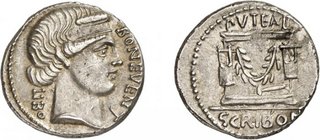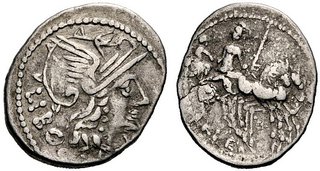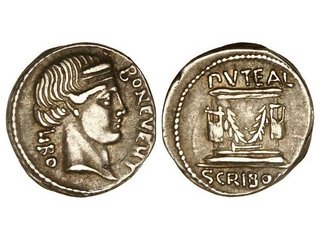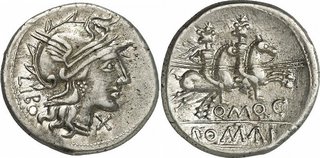Palemon
http://mitencyklopedia.w.interia.pl/palemon.html
in. Publius Libo(n), wymieniany w anonimowym latopisie litewskim z XVI wieku i "Kronice litewskiej" Bychowca (z lat 1564-1574), wspominany też przez A. Rotundusa (1564), Macieja Stryjkowskiego ("Kronika polska, litewska, żmódzka i wszystkiej Rusi", 1582), Józefa Załuskiego ("Polska w obszerniejszych wiadomościach swoich skrócona", XVIII w.) i Teodora Narbutta ("Dzieje starożytne narodu litewskiego"), wielki książę litewski, protoplasta Litwinów i bohater litewskiej legendy herbowej o pochodzeniu herbu Colonna. Miał trzech synów: Borkusa (Porciusa), Kunosa (Kunassusa) i Spera. Jako przywódca uciekinierów z Rzymu, miał udać się na wygnanie i przybyć na Litwę w I n.e. lub w IV n.e., gdzie założył państwo. Palemona za swojego przodka uważały rodziny Gasztołdów i Jagiellonów, inne litewskie rody (Dowojnowie, Holsztańscy, Giedroycowie) chętnie w swoich genealogiach umieszczali towarzyszy P. Nawiązania do legendy Palemona zaczynają się od poezji Macieja Kazimierza Sarbiewski: "gdyś pieśnią jest czczona | Przez rześkie hufce rycerskiej młodzieży | Z każdego rodu, gdy kraj Palemona | Wielbi Cię cały" (Do Najświętszej Panny) i "z mgły rannej wypłynie, | Strażnica sławna ziemi Palemona" (Do Pawła Kozłowskiego). Legenda weszła na stałe do literatury romantyzmu, utwory o zamierzchłej średniowiecznej przeszłości Litwy i Prus z Palemonem, i innymi w tle powstawały zwłaszcza na Litwie - jeden z przykładów to powieść A.Mostowskiej "Astolda, księżniczka z krwi Palemona", wyd. w Wilnie w 1807 roku (pełny tytuł: "Astolda, księżniczka ze krwi Palemona, pierwszego Księcia Litewskiego, czyli Nieszczęśliwe skutki namiętności, powieść oryginalna z historii Litewskiej"). Legendę wspomina m.in. Tymon Zaborowski: "W krajach pomiędzy Wisłą a Dnieprem i Dźwiną, | Gdzie Polakom nieznane jeszcze rzeki płyną, | Wśród lasów jak świat starych, mieszka naród dziki, | Obcymi jeszcze światu mówiący języki. | Tam to jest sławna zbroja w zamku Palemona, | Zbroja ta z najczystszego śkła jest wyrobiona; | Dla ochronienia szyi i przykrycia głowy, | Do niej jest dorobiony szyszak krzyształowy. | Jeśli kto te odwieczne przebędzie pustynie, | Jeżeli w tej zuchwałej wyprawie nie zginie, | Jeśli mu się tę zbroję wdziać na siebie uda, | Nią okryty wejść śmiało może w zamek Bluda" ("Zdobycie Kijowa", pocz. XIX w.), Wódkołyk Porterowicz: "Ledwo okoliczności sprzyjających biegiem, | W królestwie Palemona nad Bałtyku brzegiem, | Dziewiętnastego wieku arcygodne dzieło | Pod wodzą wielkich mężów pierwszy zaród wzięło...", "Gdyż szlachetny nasz związek w Palemona kraju | Takie dzieło i temu wspólnego rodzaju, [...] | Obok błędów Wolneja i Woltera kładzie." (Pochwała pijaństwa, 1817), Adam Mickiewicz: "Krzyż, godło Niemców, czoło kryje w niebie, | Groźne ku Litwie wyciąga ramiona, | Jak gdyby wszystkie ziemie Palemona | Chciał z góry objąć i garnąć pod siebie." (Konrad Wallendrod), Władysław Syrokomla: "Wybrani świetni powiatów ojcowie, | Czyżby się Wilnu wstydzić dozwolili, | Odjąć koronę Palemońskiej głowie?..." (Wyzwolenie włościan).
BIBLIOGRAFIA Aleksander Brückner, Starożytna Litwa. Ludy i bogi, Olsztyn 1984; Marek Cetwiński, Marek Derwich, Herby, legendy, dawne mity, Wrocław 1989; E. Kulicka, Legenda o rzymskim pochodzeniu Litwinów i jej stosunek do mitu, "Przegląd Historyczny", 1980 nr 1, 1-21; Jerzy Ochmański, Historia Litwy, Wrocław 1967; Maciej Stryjkowski, Kronika polska, litewska, żmódzka i wszystkiej Rusi, Warszawa 1846; J. Suchocki, Geneza litewskiej legendy etnogenetycznej. Aspekty polityczne i narodowe, Zapiski Historyczne, 52, 1987 nr 1, 27-67; W. N. Toporov, Vilnius, Wilno, Wil'na: Gorod i mif [w:] Balto-slavjanskie etnojazykovyje kontakty, Moskva 1980; Tomas Venclova, Mit o początku, przeł. Rene Śliwowski, "Teksty" 1974 nr 4, 104 - 116; M. Zachara - Wawrzyńczyk, Geneza legendy o o rzymskim pochodzeniu Litwinów, "Zeszysty Historyczne UW", 3, 1963;
http://cthulhufiles.com/cthsectl.htm
Libo, Publius Seribonius
Proconsul at Tarraco. FBL Hills 286, 289.
http://cthulhufiles.com/cthsectp.htm
Pollio, Q. Trebellius
Secretary of Publius Libo. FBL Hills 291.
http://medieval2.heavengames.com/cgi-bin/forums/display.cgi?action=ct&f=10,244,990,all
Winter 156 B.C.
Nero Propetius stared down at his young 12 year old son, Appius, who was already a master Swordsmen a good friend of his Gaius Anelus who was part of a Spartan bloodline that traveled to Rome during the time of Alexander smiled at him before looking out to the lines.
"Seven thousand Carthinginians crawling through all of are defences"
Lucis Libo Nero`s brother rode out in front of the Roman lines.
"Friends, Romans,Brothers, these Cartinginian Elephant riders have come far for the cowards they are."he paused riding past the Senate,Brutii,and Scipii forces,"I want to bathe in the Blood of there Elephants on this night."The Roman lines went into an uproar though they quieted down at the sound of Elephants charging a Equite unit came fleeing for their lives urging the others to flee.
The thunder grew even worse as out of the trees thousands of Carthenginian Elefants charged.
Lucis ordered velitesto fire and balistas to begin ranging
they all began firing in to the elephants many were slaughtered by the pilums and bolt.
The Elephants rammed into the lines many began to fleethough the Legions held the best they could.
"Signal a advance" Lucis called to the Standered corps
A singal Armored elephant almost hit Appius if it were not for anelus jamming his Gladius into the Elephants skull.
The Elephants started to flee. It turned to Carthage`s infantry who charged them now the fleeing elephants took care of that as almost every artenginian was dead.
END
http://en.wikipedia.org/wiki/Libo_(cognomen)
Libo, in ancient Rome, is the name of a family belonging to the Scribonian gens. It is chiefly interesting for its connexion with the Puteal Scribonianum in the Forum at Rome.
http://www.coinarchives.com/a/results.php?results=100&search=Libo




http://davy.potdevin.free.fr/Site/crawford5.html
L. Scribonius Libo. 62 BC. AR Denarius (3.96 gm).
BON EVENT- LIBO Diademed head of Bonus Eventus right / PVTEAL/ SCRIBON Scribonian well; tongs at base.
Crawford 416/1b; Scribonia 8.
EF.
/crawford%20400-499/cr416-1b_560$.jpg)
L. Scribonius Libo. Denier, vers 62 av. J.-C. 3,98 g.
Tête diadémée de Bonus Eventus à d., dans le champ, LIBO - BON. EVENT. Rv. Margelle du puits Scribonien ornée d'une guirlande et de deux cithares; au-dessus, enclume; dans le champ, PVTEAL / SCRIBON.
Crawf. 416/1c. Syd. 928.
/crawford%20400-499/cr416-1c_500chf.jpg)
L. Aemilius Lepidus Paullus with L. Scribonius Libo. 62 BC. AR Denarius (3.74 gm, 7h). Rome mint.
PAVLLVS. LEPIDVS CONCORD, diademed and veiled head of Concordia right / PVTEAL. SCRIBON above, LIBO in exergue, Puteal Scribonianum (Scribonian well), decorated with garland and two lyres, hammer at base.
Crawford 417/1a; Sydenham 927; Kestner 3422; BMCRR Rome 3383; CNR Aemilia 62; Aemilia 11.
EF, toned, tiny test cut on edge.
Paullus Lepidus und Scribonius Libo; AR-Denar, 62 v. Chr., Rom, 4,06 g.
Concordiakopf r. mit Schleier und Diadem//
Puteal Scribonianum, mit Girlanden und zwei Lyren geschmückt; an der Basis Zange.
Bab. 11 var.; BMC 3385; Crawf. 417/1 b; Syd. 927. Vorzüglich
/crawford%20400-499/cr417-1b_200$.jpg)
http://en.wikipedia.org/wiki/Lucius_Scribonius_Libo
Lucius Scribonius Libo
Several men of plebeian status were named Lucius Scribonius Libo during the Roman Republic and Roman Empire; they were members of the gens Scribonia.
Table of Contents
L. Scribonius Libo (praetor 204 BC)
Lucius Scribonius Libo was a tribune of the plebs in 216 BC, during the Second Punic War. A question arose pertaining to the ransoming of Roman captives; he referred the matter to the senate.[1] He was one of the three men appointed triumviri mensarii, a commission created by a Lex Minucia, possibly to deal with a shortage of silver;[2] the full range of their financial activities is unclear.[3] He was praetor peregrinus in 204 and sent to Cisalpine Gaul.[4]
L. Scribonius Libo (tribune 149 BC)
Lucius Scribonius Libo (tribune of the plebs 149 BC) was a member of a Roman Senatorial family. He accused Servius Sulpicius Galba for the outrages against the Lusitanians. He might have been the Scribonius who consecrated the Puteal Scribonianum often mentioned by ancient writers, which was located in the forum close to the Arcus Fabianus. It was called Puteal as it was opened at the top, like a well. Years later it would be repaired and dedicated by another Libo, consul of 34 BC.
L. Scribonius Libo (consul 34 BC)
Lucius Scribonius Libo (fl. 1st century BC) was consul in 34 BC. He was the maternal uncle to consul Publius Cornelius Scipio, Cornelia Scipio and Julia the Elder. Lucius died after his consulship. His wife was a member of the gens Sulpicius, the family that the Roman Emperor Galba had descended from his paternal side. When the civil war broke in 49 BC he sided with Pompey and was in command of Etruria. Afterwards he accompanied Pompey to Greece. Following the death of Bibulus he was given command of the Pompeian fleet. During the civil wars that occurred after the assassination of Julius Caesar, he sided with his son in law Sextus Pompey. In 40 BC Octavian, in order to cement a peace with Sextus, married the sister of Scribonius, Scribonia, who was much older than him. She became his first wife and bore Octavian his only natural child Julia. After this marriage a peace was made between the Triumvirs (second triumvirate) and Sextus with the Pact of Misenum in 39 BC. After the war was renewed in 36 BC, Scribonius felt the cause was lost and abandoned Sextus. In 34 BC he was consul with Mark Antony. Lucius and wife had three children, two sons: Lucius Scribonius Libo (below) and Marcus Scribonius Libo Drusus and a daughter Scribonia who married Sextus Pompey. In 62 BC Scribonius repaired the Puteal Scribonianum and issued coins to commemorate the event.
L. Scribonius Libo (consul 16 AD)
Lucius Scribonius Libo (d. 16 AD) was son of the above. He was a consul in 16. This nobleman had planned to revolt against the Roman Emperor Tiberius. The Emperor had tried him in a Senatorial Court. Lucius had pleaded to the Emperor for the support of Tiberius‘ son Drusus Julius Caesar but the emperor rejected this. Lucius and Tiberius took part in a sacrifice among the priests. During the ceremony, the Emperor had asked Lucius for assistance, when the ceremony was over, Tiberius stabbed him with a knife. This occurred after the trial. Lucius had married Cornelia Pompeia Magna a relative, who was the daughter of Pompeia Magna from her second marriage to consul Lucius Cornelius Cinna. Pompeia bore Lucius, a daughter and only child Scribonia. Scribonia married the consul Marcus Licinius Crassus Frugi and had children.
.............................................................
http://en.wikipedia.org/wiki/Scribonia_(daughter_of_Lucius_Scribonius_Libo_consul_16)
Scribonia (daughter of Lucius Scribonius Libo consul 16)
Scribonia Magna (flourished 1st century BC & 1st century), in the modern historical sources she is known as Scribonia Crassi was a Roman noblewoman that lived in the Roman Empire. Scribonia was the daughter and only child of Lucius Scribonius Libo consul of 16 and Cornelia Pompeia Magna.
Scribonia was a noblewoman of the highest birth and had descended from ancient, distinguished and politically influential blood. Her maternal grandparents were Pompeia Magna and suffect consul Lucius Cornelia Cinna, while her paternal grandparents were consul of 34 BC, Lucius Scribonius Libo and his wife was a member of the gens Sulpicius, the family that the Roman Emperor Galba, had descended from his paternal side. Scribonia’s parents were both direct descendants of Pompeia Magna, the daughter of triumvir Pompey from his third marriage to Mucia Tertia. Lucius Scribonius Libo was a descendant of Pompeia Magna, from her first marriage to senator Faustus Cornelius Sulla, while Cornelia Pompeia Magna was the daughter of Pompeia Magna from her second marriage to suffect consul Lucius Cornelius Cinna.
Scribonia was born before 16, as in 16 her father was stabbed to death by the Roman Emperor Tiberius, who had charged him in planning a revolt against the emperor. Scribonia was born and raised in Rome. Very little is known on her life.
Scribonia had married Marcus Licinius Crassus Frugi, a man of consular rank. Frugi’s father, consul and governor Marcus Licinius Crassus Dives, was the adopted son of consul and general Marcus Licinius Crassus Dives the grandson of triumvir Marcus Licinius Crassus. He was the last known direct descendant of the triumvir and was the last known direct descendant of the triumvir who bore his name.
Scribonia bore Frugi four sons and they were:
- Marcus Licinius Crassus Frugi II - Frugi served as consul in 64 under Roman Emperor Nero. Frugi was later killed by Nero sometime before 68.
- Gnaeus Pompeius Magnus - who married Roman princess Claudia Antonia in 43, the daughter and only child of Roman Emperor Claudius from his second marriage to Aelia Paetina. Antonia married him as her first husband and they had no children. Magnus was murdered in 47.
- Marcus Licinius Crassus Scribonianus - sometime between 68 and 69, the general Marcus Antonius Primus, had offered Scribonianus the Roman Empire and position of Roman Emperor, however Scribonianus refused to accept this.
- Lucius Calpurnius Piso Frugi Licinianus or Lucius Calpurnius Piso Licinianus (38-69). Licinianus was adopted by the brief Roman Emperor Galba, who reigned between 68-69. Licinianus became Galba’s son and heir, who was murdered on the orders of Otho, when trying to obtain the Roman throne. Licinianus married a Roman woman called Verania, who came from a family of consular rank.
In the spring of 47 Scribonia, her husband and her second son Gnaeus Pompeius Magnus were executed on the orders of Roman Empress Valeria Messalina. After Scribonia, her husband and her son had died, the three were placed in the tomb of Licinii Calpurnii that is located on the Via Salaria. Also placed in the tomb was their first son.
Scribonia and Frugi from their first son’s marriage had two grandsons Calpurnius Piso Crassus Frugi Licinianus who was consul in 87 and suffect consul in 88 Lucius Scribonius Libo Rupilius Frugi Bonus. Calpurnius Piso Crassus Frugi Licinianus and his wife Agedia Quintina had conspired against the Roman Emperor Nerva and the couple was banished by Nerva to Taranto. Calpurnius Piso tried for a second time to escape and was banished by the Roman Emperor Trajan to a solitary island and on his third attempt to escape he died. Calpurnius Piso was also placed in the tomb of Licinii Calpurnii. Lucius Scribonius Libo Rupilius Frugi Bonus was an ancestor to Roman Emperor Marcus Aurelius.
.............................................
Notes
- ^ Livy 22.61.7.
- ^ Livy 23.21.6.
- ^ See discussion by Rachel Feig Vishnia, State, Society, and Popular Leaders in Mid-Republican Rome, 241-167 B.C. (Routledge, 1996), p. 86ff. online.
- ^ T.R.S. Broughton, The Magistrates of the Roman Republic (New York: American Philological Associaton, 1951, 1986 printing), vol. 1, pp. 249, 306, and vol. 2 (1952), p. 614.
External links
http://es.wikipedia.org/wiki/Lucio_Julio_Libón_(padre_de_Numerio)
Lucio Julio Libón (en latín: Lucius Iulius Libo; fl. Siglo III a. C.) fue un destacado senador romano de su época perteneciente al clan de los Julio Césares dentro de la poderosa familia patricia romana de los Julios.
Biografía
Lucio Julio Libón fue hijo de otro Lucio Julio Libón, quien fue cónsul romano en en 267 a. C., mientras que su madre es Cecilia Metelo Macedónica, hija de Lucio Cecilio Metelo Denter. Prácticamente no se sabe nada de su carrera política, lo único que es seguro es que no llegó al consulado, por lo demás, no podemos afirmar si llegó a la pretura. Sin embargo, pasó a la historia por ser uno de los ancestros del famosísimo Julio César. En efecto, Lucio Julio Libón tuvo al menos un hijo, Numerio Julio César, con una mujer cuyo nombre nos es desconocido. Este, fue el abuelo del tatarabuelo de Julio César, dictador vitalicio.
http://es.wikipedia.org/wiki/Lucio_Julio_Libón_(cónsul_267_a._C.)Lucio Julio Libón (cónsul 267 a. C.)
Lucio Julio Libón (en latín clásico: LVCIVS·IVLIVS·LIBO) fue un político y militar romano, que floreció en el tercer siglo antes de Cristo.
Ancestros
Libo desciende de los Julia que llegaron a Roma procedentes de Alba Longa. Esta ciudad fue destruida por el tercer rey romano, Tulio Hostilio. Sus ancestros se decían descendientes de Venus y de Rómulo el fundador de Roma.
Senador y Cónsul Romano
Fue Cónsul, tres años antes de la primera guerra púnica, en el año 267 a. C., con Marco Atilio Régulo, se le atribuye la conquista de Brundisium (hoy Brindisi) y la derrota de los salentinos de Apulia. Fue un miembro del poderoso clan "Gens Julia", los cuales estuvieron activos en política desde las Guerras Púnicas.
Al terminar la guerra el Senado le concedieron los honores de un triunfo romano.
Matrimonio y descendencia
Contrajo matrimonio al parecer con Cecilia Metelo Macedónica, hija de Lucio Cecilio Metelo Denter. Tuvo un hijo del mismo nombre, Lucio Julio Libón, que fue el padre de Numerius Julius Cesar, abuelo este último a su vez de Sexto Julio César I, el tatarabuelo del celebérrimo Julio César.
en.
Lucius Julius Libo
Lucius Julius Libo was a member of the influential Julii clan. This patrician family was always of the most distinguished blood, however they had long since fallen out of the inner Roman elite. The Julii were active in politics since the Punic Wars.
Libo descended from the Julii who fled from Alba Longa to Rome. This city was destroyed by the Roman king Tullus Hostilius. His ancestors claim their descent from the goddess Venus and the first Roman king Romulus. He had a son of the same name Lucius Julius Libo II with Caecilia Metella Macedonica, daughter of Lucius Caecilius Metellus Denter and Barsine of Macedonia.
Libo was consul in 267 BC. According to the Fasti Triumphales he celebrated a triumph over the Sallentini on 23 January 266 BC. His son of the same name was father to Numerius Julius Caesar, born before 300 BC. Numerius was a grandfather to Sextus Julius Caesar I.
http://mcadams.posc.mu.edu/txt/ah/Livy/Livy29.html
Livy's History of Rome: Book 29 Book 29: Scipio in Africa L. Scribonius Libo
[29.13]P. Sempronius and M. Cornelius entered upon their consulship in the fifteenth year of the Punic War. To the latter was decreed the province of Etruria with the standing army there; Sempronius received Bruttium and had to enrol fresh troops. Of the praetors, M. Marcius took over the City jurisdiction, L. Scribonius Libo was charged with the jurisdiction over aliens and also the administration of Gaul, Sicily fell to M. Pomponius Matho, and Sardinia to Tiberius Claudius Nero. P. Scipio had his command extended for twelve months with the army and fleet which he already had. P. Licinius was to remain in Bruttium with two legions as long as the consul thought it advisable for him to retain his command there. M. Livius and Sp. Lucretius were also to retain the legions with which they had been protecting Gaul against Mago. Cnaeus Octavius was to hand over his legion and the command in Sardinia to Nero and take charge of a fleet of forty ships for the protection of the coast within the limits fixed by the senate. The remains of the army of Cannae, amounting to two legions, were assigned to M. Pomponius, the praetor commanding in Sicily. T. Quinctius was to hold Tarentum and C. Hostilius Tubulus Capua with the existing garrisons - both with the rank of propraetor. With regard to the command in Spain it was left to the people to decide upon the two proconsuls who were to be sent into that province and they were unanimous in retaining L. Cornelius Lentulus and L. Manlius Acidinus in command there. The consuls proceeded with the enlistment, as ordered by the senate, for the purpose of raising fresh legions for Bruttium and bringing the other armies up to full strength.